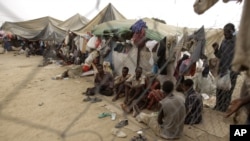The International Organization for Migration (IOM) reports an extortion racket is flourishing in war-torn Yemen. The IOM says traffickers, armed groups and others are kidnapping vulnerable Ethiopian migrants on their way to Saudi Arabia and holding them for ransom.
The IOM has helped nearly 3,500 Ethiopian migrants stranded by the conflict in Yemen return home. From extensive interviews with returnees, the IOM has pieced together a disturbing picture of traffickers preying upon vulnerable migrants en route to Saudi Arabia in search of work.
IOM spokesman Joel Millman said some of the cases documented by aid workers are frightening.
"There appears to be militia activity or armed traffickers swapping groups of men back and forth, and charging what look to be growing ransoms - anywhere from 2,000 to 4,500 Saudi riyals, which is around $600 to $1,000 U.S. per person. People being held, tortured and injured," he said.
Millman said many of the Ethiopian migrants seeking assistance from the IOM have been wounded from airstrikes or shootings involving armed groups. In some cases, he said, the traffickers themselves resort to violence against the men they kidnap on their way to Saudi Arabia.
Despite the dangerous war situation in the country, Millman told VOA impoverished migrants from the Horn of Africa continue to cross the strait into Yemen in hopes of finding work in Saudi Arabia. He said these people are easily victimized and vulnerable to being captured by traffickers, who hold them for ransom.
“This pattern has repeated itself across Africa in the last 10 years, where vulnerable people become vulnerable to kidnapping by armed groups and then are forced to pay ransom even when it was not their intention to make that kind of journey. That appears to be happening in Yemen now,” he said.
Millman said victims who do not come up with the money or are not ransomed by their families are subjected to torture, shootings and beatings. He says a number of migrants the IOM has repatriated have had to be treated for burns, gunshot wounds and broken bones.










